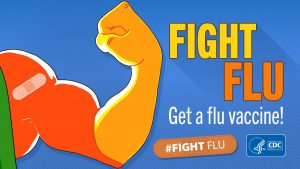CDC
 It’s National Influenza Vaccination Week (NIVW) – Dec. 1-7, 2019. NIVW highlights the importance of continuing flu vaccination through the holiday season and beyond. NIVW serves as a reminder that even though the holiday season has arrived, it’s not too late to get a flu vaccine.
It’s National Influenza Vaccination Week (NIVW) – Dec. 1-7, 2019. NIVW highlights the importance of continuing flu vaccination through the holiday season and beyond. NIVW serves as a reminder that even though the holiday season has arrived, it’s not too late to get a flu vaccine.
As long as flu viruses are spreading and causing illness, vaccination should continue throughout the flu season in order to protect as many people as possible against flu. Everyone 6 months of age and older should get a flu vaccine every season. Advise your patients that it’s not too late to get a flu vaccine!
Additional information and resources for NIVW can be found at: https://go.usa.gov/xPd6X

